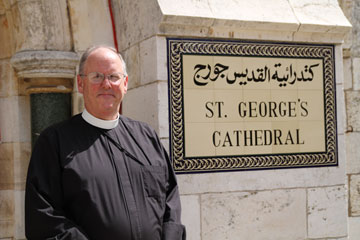Dr. Rev. Robert Edmunds --
"The term 'Palestinian Terrorist' sells"
By Tara Graham

(Photo Credit: John Adams)
"When my wife and I decided to come here, many people asked if we planned to learn Hebrew," the chaplain of St. George's Cathedral begins with a chuckle. "Well news flash, a vast majority of the indigenous Christians here are Arabs, and Arabs generally speak Arabic."
Dr. Rev. Robert Edmunds sits at a cluttered desk in a small office located near the 100-year-old church where he leads mass for a small congregation of Christians in Jerusalem.
"People always ask the local Christian community here, 'When did you convert?'" Edmunds says while shaking his head. "And we all can't help but laugh. Remember Pentecost -- that day with all the Cretins and Arabs? Well, we're the Arabs. We were here from the very beginning."
"The question is," Edmunds leans in to ask, "When did the Muslim community here convert from Christianity?"
There are around 8,000 indigenous Christians living in Jerusalem today. That number is only a small sliver of the half million people who call the Holy Land home. And there are about 2,000 expatriate missionaries, men and women like Rev. Edmunds, who stay in Israel for a couple of years to fill necessary staff positions.
Expatriate volunteers are critical, if not essential, to the functioning of the Christian community in Jerusalem, says Edmunds, who is originally from Massachusetts. They provide important political and ecclesiastical connections to the West that are crucial to the survival of the small Christian community in the Holy Land.
"It is in Israel's best interest to keep our community alive and healthy in Jerusalem because the Christian community preaches mutual respect and peaceful coexistence at all times," Edmunds says, "which is not so much the case with some of the other religious groups around here."
Edmunds is nearly two years into his Anglican outpost in Jerusalem. During his time in the Holy Land, he's been frustrated and disappointed with how the Israeli government seems to distance tourists form the local Arab Christian community, keeping it a near secret.
"The Israeli-sponsored buses only tour the holy sites and conveniently never reach our church," Edmunds says. "The term 'Palestinian Terrorist' sells, I suppose, while the term 'Palestinian Christian' is almost unknown."
"Yet, there's all these Arab Christians in Jerusalem," he sighs.
Moreover, Palestinian Christians are double marginalized, Edmunds says, because of their Arab ethnicity and also because they practice neither Judaism nor Islam, the two dominant religions in the region.
"The Arab Christian community here is tiny compared to the Jewish community and even tinier compared to the Arab Muslim community," he says. "Being an Israeli citizen throws yet another twist on things."
The local government doesn't treat the Arab Christian community with a lot of respect, according to Edmunds. His community has little to no access to the government, he says, which means Christians have little to no say in important decisions regarding the holy sites.
"A lot of Christians feel isolated and left out," he comments. "They feel they've been good stewards of the holy sites throughout the centuries, but when it comes time to make political decisions now, they feel the churches are given outsider status. And that's a bitter pill."
Control over the holy sites is a big contention in Jerusalem. Those in control ultimately get to decide who gets access, who gets taxed and who gets to oversee the upkeep of the sites.
"The Israelis want total control of the property," Edmunds says. "And in my opinion, there are many folks in government right now who'd be happy to see the Christian community just kind of disappear, so they can turn the holy sites into a theme park and be done with it."
The government officials are to blame for the ongoing battle over real estate rights and access, Edmunds says. The everyday people he's encountered during his short stay in Jerusalem, by and large, just want resolve.
"The political leaders are all screwed up," he says, "but the people here just want to get this thing fixed. This is not a joke to them. They really want to see a compromise happen."
"At least, that's what I see going on," he says with a nod.
